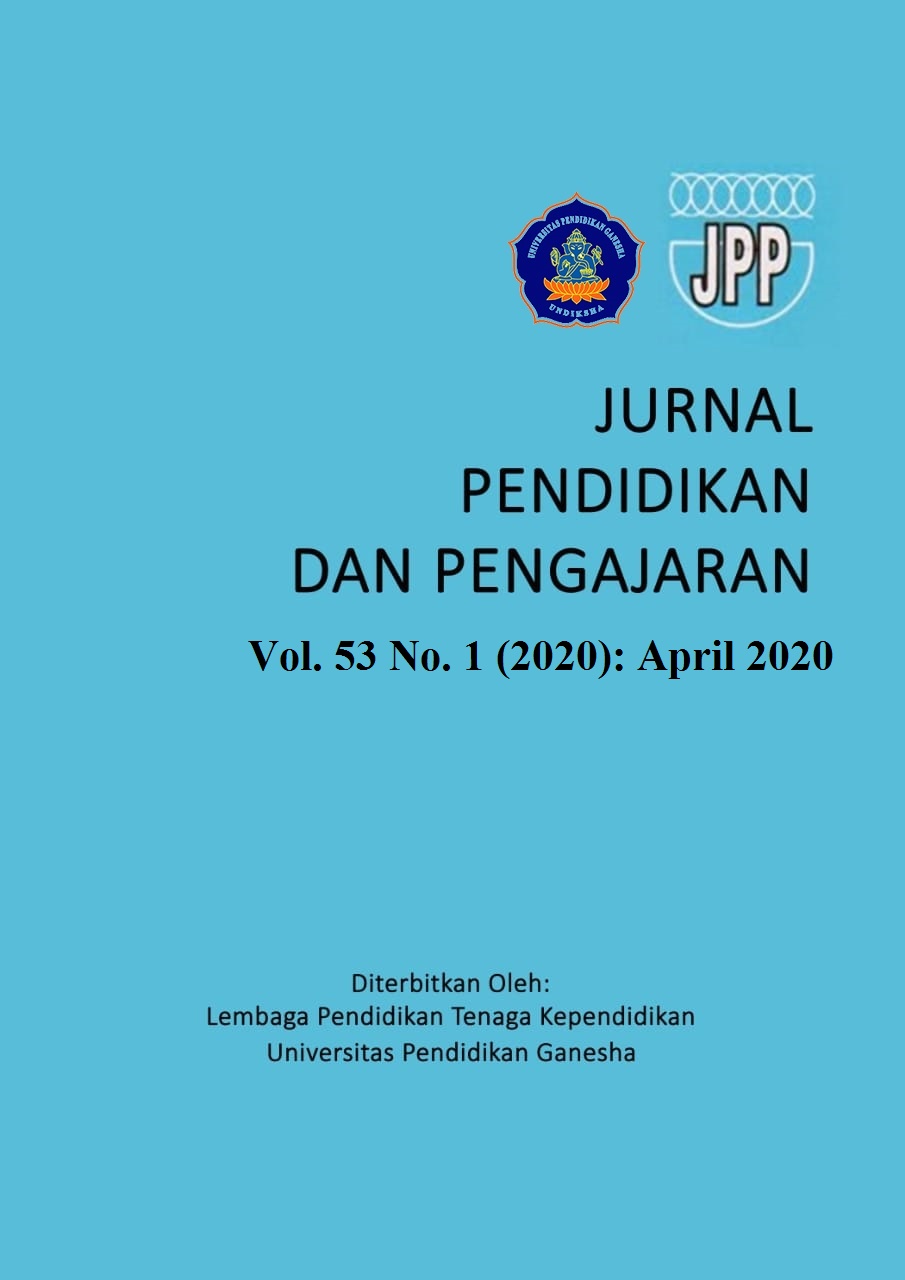The roles of EFL Teachers in Promoting Learner Autonomy
DOI:
https://doi.org/10.23887/jpp.v53i1.19241Keywords:
Learner autonomy, the roles of English teachers, English as Foreign LanguageAbstract
This study is a descriptive-qualitative study which aimed to describe the roles of EFL teachers in promoting learner autonomy. Four EFL teachers in seventh grade junior high schools were selected as the subject of this study. The data were collected through questionnaire and observation techniques. In collecting the data, two kinds of instruments were used, namely, questionnaire and observation sheet. The result of this study revealed that in promoting learner autonomy, the teachers perform the roles as facilitator, counsellor, resource and manager/organizer. Considering the result of the study, the teacher should involve their students in the decision making process of learning activity, not only in selecting the technique or approach, but also in all aspects of learning process such as selecting objectives of the course, managing classroom and selecting the materials. Schools also need to support their teachers in developing innovative strategy especially in promoting learner autonomy. The schools should offer teachers with professional development programs on learner autonomy such as following workshops. For further researchers, considering the challenges met by the EFL faced by the EFL teachers in promoting learner autonomy is needed.
References
Alonazi,S.M. (2017). The role of teachers to promote learner autonomy in secondary schools in saudi arabia.English Language Teaching, 10 (7), 183-202.doi: 10.5539/elt.v10n7p183.
Benson, P. (2001). Teaching and researching autonomy in language learning. Essex: Pearson Education Ltd.
Deci, E.L. & Ryan, R.M. (eds) (2002). Handbook of self-determination. Rochester, NY: University of Rochester Press.
Fumin, F & Lee, Z. (2012). Teachers’ roles to promote students’ learner autonomy in china. English Language Teaching. 5 (4), doi:10.5539/elt. v5n4p51.
Ja, R.(2017). English teachers’ roles to promote learners’ learning autonomy in EFL class of public senior high schools of Ende regency in academic year 2016 / 2017. Journal of Education and Human Development,6 (2), 105-112. DOI: 10.15640/jehd.v6n2a1
Joshi, K. (2011). Learner perceptions and teacher beliefs about learner autonomy in language learning. Journal of NELTA. 16 (12), 13–29
Lamb, M. (2004). It depends on the students themselves: Independent language learning at an indonesian state school. School of Education, 17(3), 229-245.
Lin, L., & Reinders, H. (2018). Students’ and teachers’ readiness for autonomy: Beliefs and practices in developing autonomy in the Chinese context.Asia Pacific Education Review. https://doi.org/10.1007/s12564-018-9564-3.
Nakata, Y. (2011). Teachers’ readiness for promoting learner autonomy: A study of japanese efl high school teachers. Teaching and Teacher Education, 27(5), 900–910.
Onozawa, C. (2010). Promoting autonomy in the language class: How autonomy can be applied in the language class? Retrieved from www.kyoai.ac.jp/college/ronshuu/no-10/onozawa1.pdf
Partnership for 21st Century Skills (2016). Framework for 21st Century Learning 01/16. Retrieved 26 February 2020 from http://www.p21.org/storage/document s/docs/P21_framework_0816.pdf
Riley, P. (1997). The guru and the conjurer: aspects of counselling for self- access. In P. Benson, & P. Voller (Eds.), Autonomy and independence in language learning (pp. 114-131). New York: Longman.
Şakrak-Ekin, G., & Balçıkanlı, C. (2019). Does Autonomy Really Matter in Language Learning? Journal of Language and Education, 5(4), 98-111. https://doi.org/10.17323/jle.2019.8762
Scharle & Szabó, A. (2000). What Makes an Autonomous Learner? Part 1. Responsibility and autonomy. Learner Autonomy. A guide to developing learner responsibility. (4th ed.). Cambridge: Cambridge University Press.
Tran, T. Q., & Duong, T. M., EFL learners' perceptions of factors influencing learner autonomy development, Kasetsart Journal of Social Sciences (2018), https://doi.org/10.1016/j.kjss.2018.02.009
Voller, P. (1997). Does the teacher have a role in autonomous language learning. In P. Benson, & P. Voller (Eds.), Autonomy and independence in language learning (pp. 98-113). London: Longman.
Xu, J. and Xu L. (2004). College English teachers’ roles in learner autonomy, Journal of Higher Education Research, 3, 81–84.
Yan, S.(2012). Teachers’ role in autonomous learning. Retrieved from http://www. macrothink.org/journal/index.php/jsr/article/view-File/2860/237
Downloads
Published
How to Cite
Issue
Section
License
Authors who publish with Jurnal Pendidikan dan Pengajaran agree to the following terms:- Authors retain copyright and grant the journal the right of first publication with the work simultaneously licensed under a Creative Commons Attribution License (CC BY-SA 4.0) that allows others to share the work with an acknowledgment of the work's authorship and initial publication in this journal
- Authors are able to enter into separate, additional contractual arrangements for the non-exclusive distribution of the journal's published version of the work (e.g., post it to an institutional repository or publish it in a book), with an acknowledgment of its initial publication in this journal.
- Authors are permitted and encouraged to post their work online (e.g., in institutional repositories or on their website) prior to and during the submission process, as it can lead to productive exchanges, as well as earlier and greater citation of published work. (See The Effect of Open Access)





